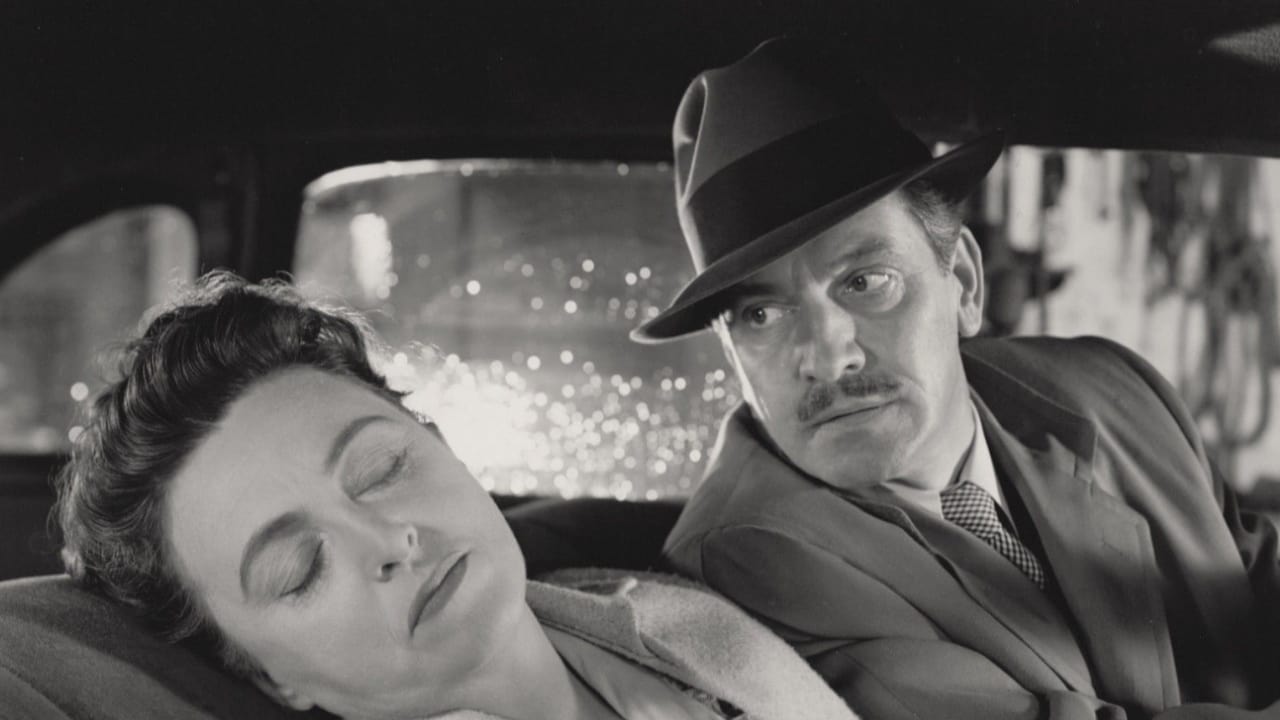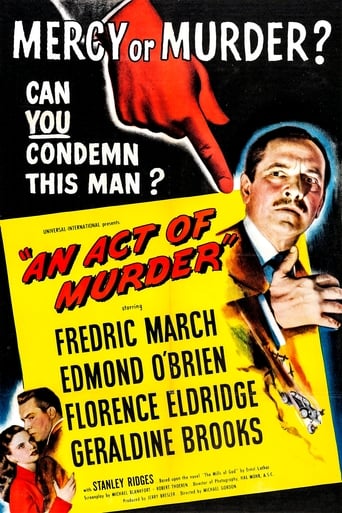



What makes it different from others?
Horrible, fascist and poorly acted
Just intense enough to provide a much-needed diversion, just lightweight enough to make you forget about it soon after it’s over. It’s not exactly “good,” per se, but it does what it sets out to do in terms of putting us on edge, which makes it … successful?
View MoreEach character in this movie — down to the smallest one — is an individual rather than a type, prone to spontaneous changes of mood and sometimes amusing outbursts of pettiness or ill humor.
View MoreNote: Today I went to hospice and said goodbye to a member of my family who has a brain tumor. So this movie resonated.Frederic March, Florence Eldredge, Geraldine Brooks, and Edmond O'Brien star in "Act of Murder," a 1948 film directed by Michael Gordon.March and Eldredge play a happily married couple, Judge Calvin and Catherine Cooke. They have a daughter (Brooks) engaged to an attorney (O'Brien) whose views are not the same as the Judge's.Catherine is suffering from severe headaches, so she sees a doctor. It turns out she is terminally ill. Apparently the practice in those days, in movies anyway, is not to tell the sick person that he or she is terminal. He does inform her husband.Catherine believes there is nothing wrong with her. The Judge decides to take her on a trip, a second honeymoon, during which she becomes violently ill and in intractable pain. When Calvin sees a wounded dog shot on a sidewalk so it wouldn't suffer, the wheels start turning.This is a story about euthanasia, a topic still hotly discussed today. Here is a man who loved his wife desperately, to the point where her pain was his as well. There's a story in Dirk Bogarde's biography about the horrible death his companion suffered; at one point, when he and another turned him during the night, his companion said, "If I were a dog, you wouldn't do this to me." It made Bogarde a proponent of euthanasia."Act of Murder" is a beautifully made movie, heart-wrenching and powerful, nominated for the Grand Prize at Cannes in 1948. The camera work by Hal Mohr is exceptional. As Catherine's and Calvin's world becomes darker and darker, we see it.Frederic March and his wife, Florence Eldredge are absolutely fantastic. They were the original stars on Broadway of Long Day's Journey into Night, and they must have been wonderful. An interesting play, like Streetcar, the focus can shift from the man to the woman, depending on the director and actors.See March and Eldredge in this film.
View MoreThere's something quite remarkable at the heart of this honest and direct portrayal of a very human crisis. The leads here - Frederic March and Florence Eldridge, real-life husband and wife - are completely and thoroughly a middle-aged couple and depicted as such, in all their wrinkles and folds and reflections on lives that have been lived. It's a reminder that the two kinds of people we see in movies are the very young and beautiful and the very old. The Cookes here are seemingly fully filled in, a husband and wife with grown children, in the midst of real lives, inhabiting their marriage with the deep love that is far beyond the romantic love that's the staple of motion pictures. This isn't the dashing Frederic March of the 1930s but a mature, restrained father and husband. It's a bit melodramatic at times - director Michael Gordon is a journeyman professional and not William Wyler, director of the great film of that era starring March, The Best Years of Our LIves. But watch for the details, such as the sharp, discordant strings stabbing along as windshield wipers swipe across the screen. I think I saw that in another movie made a few years later.
View MoreI watched "An Act of Murder" because I love the actors Frederic March and Edmund O'Brien. Both were Oscar-winning actors who were not exactly handsome (especially as they aged) and managed to give one impressive performance after another over the decades. Sadly, however, despite having two excellent stars, the film lost its momentum towards the end.When the film begins, March plays a tough-as-nails judge and O'Brien a bleeding-heart defense attorney. The two don't like each other all that much--and late in the film, O'Brien's character comes to the judge's defense when he's on trial for a mercy killing. In between is the part of the film I loved most--and which is totally obscured by the ending which is filled with speechifying and some bizarre behavior by March's character. It's a shame, as the idea of mercy killing and medical ethics are really interesting topics and it's pretty amazing to see them talked about in the 1940s, as usually films deliberately avoided this back in the day.
View MoreThis is like the forgotten good film in Fredric March's career. People talk about ANTHONY ADVERSE, DR. JECKYLL AND MR. HYDE, THE BEST YEARS OF OUR LIVES, INHERIT THE WIND, or THE ADVENTURES OF MARK TWAIN, but AN ACT OF MURDER is rarely recalled because of it's odd story. At a time when American film audiences wanted to forget World War II and the death and destruction it entailed, March and his wife Florence Eldrich appeared in the only film where their roles were equally important where the subject was euthanasia. It was well told, with March as Judge Cooke, a fiercely strict jurist who rarely showed a drop of mercy towards a convicted defendant. He finds his beloved wife is dying of an incurable, and slowly debilitating disease. While she slowly declines (and very visibly shows her own suffering) the Judge grimly determines to kill her by a convenient car accident. But after the accident the Judge confesses, and faces conviction in his own courthouse. Only at the last moment is he saved from the unforgiving penal code he is always upholding.It is well acted (Edmond O'Brien giving good support as a liberal-minded attorney who is romancing March and Eldrich's daughter). But the best part is watching the chemistry between March and Eldrich. Only their joint appearances in ANOTHER PART OF THE FOREST and INHERIT THE WIND come close to this, but Eldrich's parts in those films is not as essential as her role in this one. And the subject matter is rarely tackled (certainly not in the 1930s or 1940s). If the end is a bit of a cop-out (the trial reveals that March is not guilty) it still is a brave subject to have tackled at all.
View More